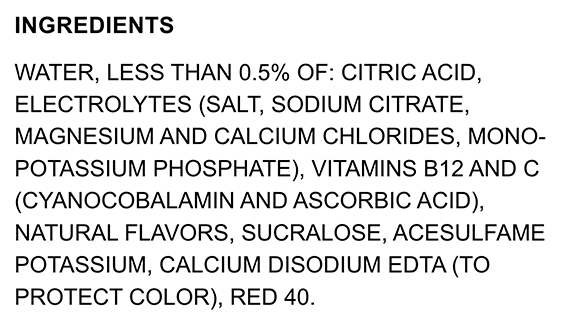
Powerade Zero is the zero-calorie version of the popular sports nutrition drink Powerade. The brand describes this product as containing "50% more electrolytes vs the leading sports drink."
But can the electrolytes in Powerade Zero enhance performance? Does the brand use unhealthy sweeteners? Is Powerade Zero healthier than original Powerade? And how does Powerade Zero compare to other zero-calorie sports nutrition drinks like Gatorade Zero?
In this article we'll answer all of these questions and more, as we analyze the ingredients in Powerade Zero to give our take on whether or not the popular sports drink is bad for you.
We'll also compare Powerade Zero to other popular sports drinks to give our pick on which is healthier, as well as compare it to original Powerade.
Key takeaways:
- Contains many flavoring ingredients we consider unhealthy
- Healthier than BodyArmor Lyte
- We consider Powerade Zero to be bad for you
Ingredient Analysis
The ingredients in the Fruit Punch flavor of Powerade Zero are shown above:

image source: powerade.com
Sodium and potassium are the only ingredients listed on the Nutrition Facts label, at respective doses of 250 milligrams (mg) and 80 mg per serving.
Electrolyte-enhanced drinks can optimize athletic performance according to a medical review published in the Nutrients journal, because they sustain endurance and may enhance recovery.
But the inactive ingredients make Powerade Zero not worth the potential benefits from the electrolytes in our opinion.
Citric acid is shown to cause whole-body inflammation in some individuals according to a series of case reports published in the Toxicology Reports journal.
Natural flavors is a broad categorical term that fails to document the specific flavoring agents used, and as we discussed in our article on is Vitamin Water good for you, some flavoring ingredients and their metabolites may be harmful to human health according to at least one medical review.
Sucralose and acesulfame potassium are artificial sweeteners, the former of which is clinically shown to have negative effects on insulin levels.
Red 40 is an artificial colorant shown in a 2012 medical review to be contaminated with cancer-causing compounds in some cases.
Overall, we consider Powerade Zero to be bad for you based on the inactive ingredients highlighted above.
Is Regular Powerade Healthier?
The ingredients in Powerade Fruit Punch are shown below:

image source: powerade.com
High fructose corn syrup is a refined form of added sugar, and the entire bottle contains 51.5 grams (g) of added sugar, which is more than 100% of the Daily Value.
A meta-study published in the Frontiers in Nutrition journal reported that high fructose corn syrup had worse effects on metabolic health than table sugar.
Beyond the sweetener, the inactive ingredients in this formulation are very similar to that of Powerade Zero.
We consider Powerade to be less healthy than Powerade Zero, because we consider high doses of added, refined sugar to be worse for metabolic health than artificial sweeteners.
Powerade Zero vs. the Competition
BodyArmor Lyte and Gatorade Zero are two of the most popular zero-calorie sports drinks on the market.
Here's how they stack up to Powerade Zero in terms of healthiness in our opinion:
BodyArmor Lyte
Contains citric acid and synthetic vitamins, but is free of artificial sweeteners and artificial flavors.
Provides a higher per-serving dose of magnesium and potassium, both minerals that we consider Americans more likely to be deficient in than sodium (which is included in many processed foods)
Winner: BodyArmor Lyte
Gatorade Zero
Very similar formulation to Powerade Zero. Contains citric acid, artificial sweeteners and artificial color.
However, as we documented in our article on does Gatorade Zero have electrolytes, the electrolyte dose in Gatorade Zero per-serving is lower than that in Powerade Zero.
Winner: Powerade Zero




























































